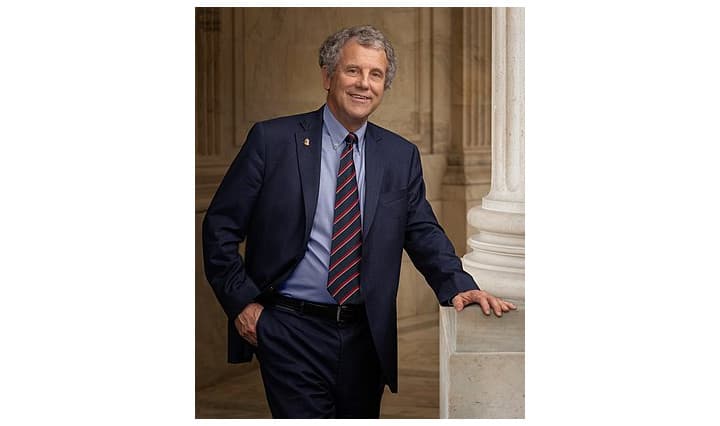Brown to Regulators: You Are Responsible for Making Sure the Financial System Operates Safely. "we know the complaints that are coming""I trust that your agencies see these arguments for what they are: the same old Wall Street whining"

U.S. Sen. Sherrod Brown (D-OH), Chair of the U.S. Senate Banking, Housing, and Urban Affairs Committee delivered the following opening statement at the hearing on “Oversight of Financial Regulators: Protecting Main Street Not Wall Street” the other day.
Today we’ll hear testimony from the heads of the four federal agencies responsible for protecting our banking and credit union system and making sure it serves everyone: the Board of Governors of the Federal Reserve System, the Federal Deposit Insurance Corporation or FDIC, the National Credit Union Administration or NCUA, and the Office of the Comptroller of the Currency or OCC.
Welcome to you all and thank you for being here today.
Earlier this year, we witnessed three of the largest bank failures in US history.
These failures reminded us that bankers’ hubris, greed, and negligence continue to pose grave threats to our financial system, and to American workers and small businesses.
This time our system bent, but fortunately it did not break.
To avoid breaking, however, the Treasury Department and your agencies had to intervene and invoke the systemic risk exception and guarantee all deposits at Silicon Valley Bank and Signature Bank.
It should never have gotten that far.
The bank failures exposed weaknesses in the supervision of the banking system, disrupted the financial system’s stability, and reminded many Americans that they just don’t trust Wall Street.
A disconcerting finding in the aftermath of the failures was that your agencies did identify the risks at these institutions, and you called them out. But that failed to result in real action from the banks’ management to actually do anything to mitigate those risks.
It’s as predictable as it is unacceptable, after years of lobbying for weaker rules and lax oversight, including by SVB and Signature Bank executives.
We must turn the lessons of this year into action.
That means improving bank supervision and holding bank executives accountable for risky behavior that drives their banks into the ground. And it means strengthening rules, so that banks are serving their communities and have the capital necessary to continue serving their communities during stress events.
These are things that we should all agree about.
It’s why, in the wake of this bank crash, we worked together to take the first real action in more than a decade to rein in risky behavior by bank executives.
Congress must finish the job and pass our bipartisan RECOUP Act, to hold senior bank executives accountable when they gamble with customers’ money.
The turmoil in the financial industry earlier this year reminded us about the policies and actions that continue to make the biggest banks even bigger, and leave the financial system vulnerable to the ever-expanding balance sheets of the largest institutions in the country.
We have created a financial system where just a handful of the largest banks now hold $14.75 trillion in assets—more than half the nation’s GDP.
Fewer and larger banks mean consumers have less choice in the marketplace for banking services.
Less competition means banks pay depositors less and charge higher fees.
Mergers and acquisitions also serve as justification for branch closures, particularly in rural areas and working-class communities. We’ve seen that far too often in Ohio.
And we know that drives more consumers out of the banking system toward high-fee, predatory non-bank financial companies—like check cashers and payday lenders and fintech apps.
Banking consolidation also means reduced access to credit for small businesses and increased borrowing costs.
And fundamentally, it means that more power in our economy ends up concentrated in the hands of a tinier and tinier number of big bankers on Wall Street.
We’ve seen over and over what a problem that is, and the harm the Wall Street business model does in places like Ohio – encouraging everything from inflation to outsourcing to lax safety.
We need strong action now from your agencies on this issue, because these trends impose real and direct costs on Americans.
With less competition, less choice, and less access, it is more important than ever that we ensure banks are meeting the needs of their entire community.
That is why I was encouraged to see that the FDIC, Federal Reserve, and OCC were able to come together last month and finalize the new Community Reinvestment Act rules.
The Community Reinvestment Act was enacted in 1977 to ensure that banks meet the credit needs of all the communities in which they do business.
The CRA regulations last received a significant refresh in 1995.
Since 1995, the internet and mobile technology have fundamentally altered how Americans interact with the banking system.
This modernization effort is critical to ensuring that banks are fulfilling the promise of the Community Reinvestment Act by serving and investing in their communities.
I thank your agencies for working through this very complex rulemaking and delivering a final rule that will encourage banks to meet the credit needs of their entire community.
In addition to the Community Reinvestment Act, the FDIC, Federal Reserve, and OCC also issued what’s known as the Basel III Endgame capital proposal – for anyone not steeped in financial regulations, that’s an actual rule critical to protecting the economy, not the latest video game or Marvel movie.
These capital rules represent the final – and long, long overdue – plank in the post-Financial Crisis overhaul of our regulatory capital framework.
It’s about ensuring that the largest banks have enough capital to address the risks that are unique to their institutions, and weather crises and emergencies and other sudden events that affect their banks.
The proposal also recognizes the systemic importance of banks that are large, just not quite as massive as the Wall Street megabanks – banks like Silicon Valley, before it collapsed. As we saw this spring, mismanagement and risky bets at those banks can still threaten the financial system – they also need to have enough capital to prevent the kind of threat to the economy we worried about earlier this year.
Of course, we know the complaints that are coming – in fact, they started before we even saw the proposal.
The industry has relentlessly attacked it with the same old tired arguments.
Compliance will cost too much, we won’t be competitive, we already have enough capital, we won’t be able to lend to small business.
We’ve heard it all before.
Let’s be clear: The largest banks will need to re-direct a tiny fraction of their enormous profits over a period of several years to get to the new capital levels.
Every single bank that would be impacted by this proposal has the capacity to comply with the new capital levels and extend credit to small businesses and working class and middle class families – all while remaining wildly profitable.
I trust that your agencies see these arguments for what they are: the same old Wall Street whining.
And that you will deliver a strong capital rule – one that prioritizes the American people and their communities over quarterly profits of the banking industry.
Finally, as we have discussed on this committee, illicit finance continues to pose a serious threat to the United States and the world. We’ve of course seen it most recently with the funding Hamas was able to raise for its terrorist attacks on Israel.
I implore your agencies to be vigilant when it comes to all the risks associated with illicit finance and the banking and credit union system.
You are all public servants, responsible for making sure that the financial system operates in a safe and sound manner and works for the American people.
Do not let us down.
"You are all public servants, responsible for making sure that the financial system operates in a safe and sound manner and works for the American people."
"Do not let us down."

TLDRS:
- U.S. Senator Sherrod Brown chaired a Senate Banking Committee hearing titled "Oversight of Financial Regulators: Protecting Main Street Not Wall Street," focusing on the role of federal agencies in regulating the banking and credit union system.
- The hearing included testimony from heads of the Federal Reserve, FDIC, NCUA, and OCC, discussing how to ensure the banking system serves all citizens and addresses recent large bank failures.
- In his statement, Brown emphasized the need for improved supervision and accountability in banking, citing recent failures as evidence of systemic weaknesses and the influence of Wall Street's lobbying for relaxed regulations.
- The Senator advocated for stronger banking rules and the passing of the bipartisan RECOUP Act to hold bank executives accountable for risky behaviors that jeopardize banks and their communities.
- Brown highlighted the issues of banking consolidation, resulting in fewer, larger banks with more power, leading to reduced consumer choice, higher fees, and greater reliance on high-fee, predatory non-bank financial companies.
- He commended the FDIC, Federal Reserve, and OCC for finalizing new Community Reinvestment Act rules and discussed the Basel III Endgame capital proposal, stressing the need for large banks to have sufficient capital to manage risks and crises.
- Brown concluded by urging vigilance against illicit finance risks and the importance of financial agencies ensuring the system operates safely and in the public interest.
- "You are all public servants, responsible for making sure that the financial system operates in a safe and sound manner and works for the American people." "Do not let us down."
